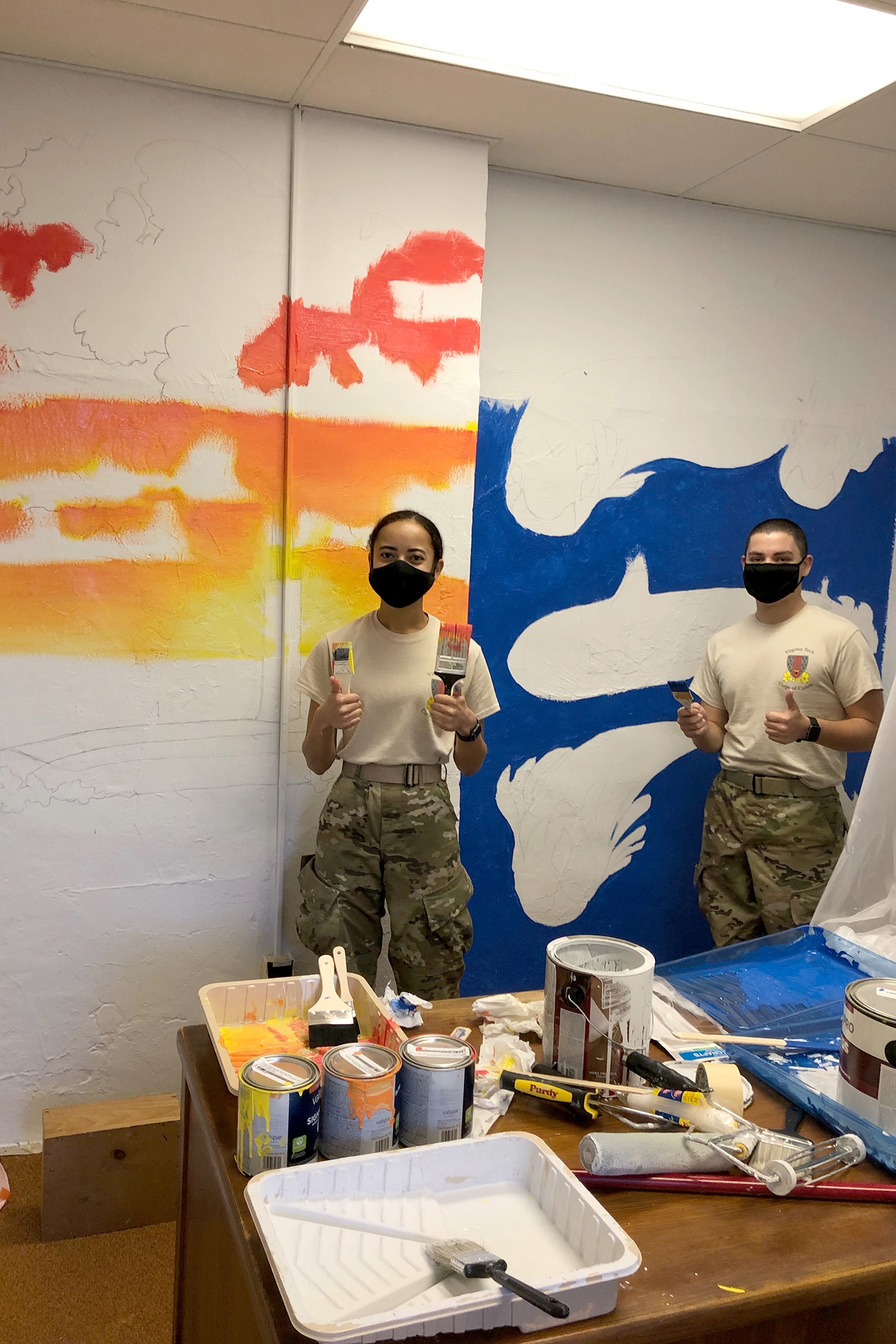Naval ROTC News
By Midshipman MacLayne Morrow '22
Despite the many changes 2020 has brought, the Navy ROTC’s mission remains the same: “To commission ensigns and second lieutenant warfighters, ready to lead sailors and Marines world-wide, aboard submarines, surface ships, aircraft, and on the field of battle.”
The unit has excelled in accomplishing this mission, commissioning a nationwide ROTC best of 51 officers and conducting the unit’s first “virtual” commissioning ceremony in May. The unit capped off a strong spring semester as a battalion, earning an average midshipman grade-point average of 3.53 and average scores of Excellent Medium and 277 out of 300 on the Navy and Marine Corps Physical Fitness Assessments, respectively.
Additionally, Virginia Tech Navy ROTC produced a nationwide ROTC best with four selectees for the SEAL officer selection summer cruise and three selectees for the Explosive Ordnance Disposal (EOD) summer cruise, two of the most highly selective Navy programs!
Because of COVID-19, nearly all summer training programs were canceled except for Marine Corps Officer Candidate School and the Navy’s EOD summer cruise.
Back in Blacksburg, more changes were afoot. After 37 years of operating from Femoyer Hall, the unit moved into Bay 1 of historic Lane Hall and simultaneously prepared to meet the challenge of Navy and Marine Corps officer development training during the COVID-19 pandemic.

Fall Successes
Starting the fall semester 326 midshipmen strong, the nation’s largest Navy ROTC unit flexed operations across a spectrum of virtual, hybrid, and in-person classes to continue meeting the unit’s mission.
Commanding Officer Capt. Douglas Bradley states, “Working through these challenges is great preparation for military officers. Virginia Tech midshipmen are developing agility — adapting, connecting, leading in small groups, and taking advantage of new opportunities to succeed. I am immensely proud of the way both the staff and students have adapted and remain focused on our mission.”
Midshipmen continue to obtain hands-on large and small-unit leadership training through numerous battalion- and company-level leadership billets. As midshipman chief petty officer (CPO) of Bravo Company, Peter Wang ’22 has learned numerous lessons from his billet. “Traditionally, the CPO job is to ensure completion and accountability of daily tasks such as physical training and the unit’s weekly professional lab courses,” Wang says. “However, this semester, the job has extended to accounting for those who are in quarantine because of [exposure to] COVID-19. If one of my midshipmen petty officers is quarantined, a squad leader or platoon guide must fill those shoes, and I will need to work with someone new and inexperienced. The same can be applied upwards in the chain of command: if my midshipman executive officer or commanding officer would have to quarantine, I would be the one to fill those shoes. That has been the most challenging part of my job — the unpredictable nature of it. However, in adapting and remaining flexible, I know I will be better prepared to handle unpredictable situations like this in the fleet.”
In addition to new office spaces, the unit welcomed the following new active duty military staff members, bringing a wide diversity of fleet experience to lead and mentor their respective companies:
- Navy Lt. Kurt Smith (Surface Warfare), Echo Company advisor
- Navy Lt. Forrest Garrison (Submarine Warfare), Alpha Company advisor
- Marine Capt. Joshua Raphaelson, Marine officer instructor
- Marine Staff Sgt. Jonathan Diehm, assistant Marine officer instructor
With additional staff, the unit created a fifth training company, Echo Company, opening more student leadership opportunities. Smith explains, “Creating another company is a triple win for the Virginia Tech midshipmen! First, each company has reduced to about 40 to 50 midshipmen each, improving the midshipmen to advisor ratio, which enables more focused time for student mentoring with the Navy staff advisor. Second, this size allows for greater team camaraderie and esprit de corps for activities without being too small or too large. Lastly, it creates an entirely new set of midshipman company billets to build those small unit leadership skills outlined in our mission at Virginia Tech.”

Raiders Earn the Title
This summer, the unit sent eight Marine candidate midshipmen to Marine Officer Candidates School (OCS) in Quantico, Virginia. OCS consisted of a seven-week training cycle that included an in-processing phase, a 14-day quarantine to ensure candidate safety, and a 28-day training period of instruction.
In those 28 days, candidates ran over 40 miles, received 70 hours of classroom instruction, and spent over 100 hours bivouacking. Graded events included physical tests ranging from a timed obstacle course to a three-mile endurance course, a Physical Fitness Test, Combat Fitness Test, two conditioning marches, academic tests as well as four knowledge-based exams, safe weapons handling, and several ethics guided discussions on Marine leadership.
Midshipman Jordan Dickey ’21 stated, “OCS provided me the opportunity to practice value-based Marine leadership in a critical and stressful environment. The emphasis on Marine Corps core values of honor, courage, commitment, and guidance I received on value-based leadership was invaluable as a prospecting Marine officer.”
All eight Virginia Tech midshipmen successfully graduated from OCS, continuing a strong 100 percent success rate for the unit. All candidates remarked how well the Virginia Tech program and leadership prepared them to succeed.


